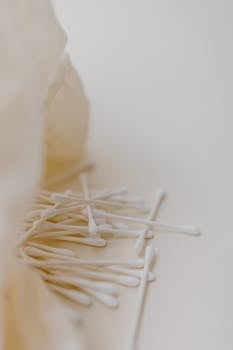
More Ear, Nose & Throat Articles
Hydrogen Peroxide in Your Ear: Is It Safe and Effective?

Hydrogen peroxide has been a mainstay in household medicine cabinets for generations, and one of its lesser-known uses is in ear care. But how effective and safe is using hydrogen peroxide in your ear? In this article, we’ll explore the potential benefits and risks of using hydrogen peroxide for ear health, discuss how it should be used, and provide reliable sources for further reading.
The Use of Hydrogen Peroxide in Ear Care
Hydrogen peroxide in ear care is primarily used as a remedy for earwax removal. Earwax, although a natural barrier protecting the ear canal from dust and microorganisms, can sometimes accumulate excessively, leading to discomfort or even hearing problems. Hydrogen peroxide acts as a softening agent, helping break down earwax for easier removal. However, its usage needs to be approached with caution.
How Does Hydrogen Peroxide Work?
The bubbling action of hydrogen peroxide occurs when it releases oxygen. This effervescence can help soften earwax, making it easier for the wax to move naturally out of the ear canal or be gently removed. While this method is widely recognized, it is important to use hydrogen peroxide in ear treatments carefully to avoid potential irritation or damage to the ear.
Benefits of Using Hydrogen Peroxide Ear Solutions
Hydrogen peroxide is favored for earwax management because:
- It’s inexpensive and readily available without a prescription.
- Its effervescent action helps in breaking down excessive earwax.
- When used correctly, it can be an effective and less invasive option for earwax removal compared to professional cleaning.
Potential Risks and Precautions
Despite its benefits, there are several risks associated with the use of hydrogen peroxide in ears:
- Incorrect use can cause irritation or damage to the ear canal or eardrum.
- There’s a possibility of exacerbating an existing ear condition or causing infection if not used properly.
- Individuals with a history of ear infections, perforated eardrums, or ear surgery should avoid using hydrogen peroxide without consulting a healthcare provider.
For further health insights on effective supplements, you can read more about IV therapy and its effectiveness compared to oral supplements.
Proper Application of Hydrogen Peroxide Ear Solutions
When using hydrogen peroxide ear solutions, it is crucial to follow these steps to ensure safety:
- Use a 3% hydrogen peroxide solution diluted with an equal part of water.
- Lie on your side and gently administer a few drops into the ear canal using a clean dropper.
- Allow the solution to sit for a few minutes to let it soften the earwax.
- Tilt your head to let the liquid drain out, and clean the outer part of the ear with a soft cloth.
If any discomfort or pain arises, discontinue use and consult a healthcare professional.
Who Should Not Use Hydrogen Peroxide Ear Treatments?
While hydrogen peroxide ear treatments can be useful, they are not suitable for everyone. Individuals with certain conditions should avoid using these treatments:
- Those having a history of ear diseases or conditions such as eczema in the ear canal.
- Individuals with a hole (perforation) in their eardrum.
- People who experience frequent ear infections should first consult their healthcare provider.
For more detailed information about ear care, you may visit Wikipedia’s comprehensive overview on ear health.
Conclusion: Is Hydrogen Peroxide in Ear Care Safe and Effective?
The use of hydrogen peroxide in ear care offers an accessible option for those dealing with earwax accumulation, but it’s not without its risks. When used correctly, it can help manage earwax buildup effectively. However, improper usage or application in sensitive ears can lead to complications. As always, consult a healthcare provider for personalized advice if you have concerns regarding ear care.
- Hydrogen peroxide in ear treatments can help in softening and removing earwax.
- It is generally safe when used properly, but caution is advised for individuals with certain ear conditions.
- Always use a diluted 3% solution of hydrogen peroxide for ear treatments.
- Consult a healthcare provider if uncertain or if discomfort occurs during use.
- Hydrogen peroxide can be a cost-effective ear care solution, but it’s important to apply it correctly.
FAQ
Is hydrogen peroxide safe for earwax removal?
When used properly and in diluted form, hydrogen peroxide can be safe for softening earwax. However, individuals with certain ear conditions should seek professional advice before using it.
How often can I use hydrogen peroxide in my ear?
Using hydrogen peroxide once every few weeks can be sufficient for managing earwax. Overuse can lead to irritation or ear damage.
What alternatives are there to hydrogen peroxide for earwax removal?
Alternatives include mineral oil, baby oil, or specific ear drops designed for earwax removal. Consult a healthcare provider for recommendations suitable for your needs.
Can hydrogen peroxide irritate my skin?
Yes, hydrogen peroxide can cause irritation if it comes into contact with sensitive skin, including the ear canal. If irritation occurs, discontinue use.
Should I consult a doctor before using hydrogen peroxide ear treatments?
Yes, especially if you have had previous ear surgeries, experience frequent ear infections, or have a perforated eardrum. It’s essential to ensure that an over-the-counter treatment is safe for your specific condition.
Other Articles You May Find of Interest...
- What Causes White Pimples in the Throat and How to Treat Them?
- Discovering the Causes and Remedies for Pain Under the Chin
- Effective Ear Drops for Infections: Relief and Treatment Options
- Soothing Foods for Throat Pain: Does Ice Cream Help?
- The Dangers of a Pill Stuck in Your Throat: What You Need to Know
- What Causes Headache Pain Behind the Ear?
- Natural Ways to Alleviate Ear Infection Symptoms at Home














